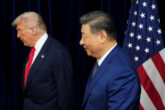March 09, 2022
Ukraine War Should Slow But Not Stop the U.S. Pivot to Asia
Until recently, a wide bipartisan consensus held that China, not Russia, represented America’s greatest national security challenge and that Asia, not Europe, was the region in which this century’s fortunes would be determined. The long-delayed “Pivot to Asia” would recognize these realities, as the U.S. devoted greater attention and resources to the Indo-Pacific.
Russian President Vladimir Putin’s brutal and unprovoked invasion of Ukraine has upended this approach. Now Washington must deal with revisionist great powers in two regions, while the Middle East also continues to demand attention.
The U.S. should continue a long-term shift to Asia, but in a way that better balances resources and engagements across the three strategic theaters.
Paradoxically, Putin’s aggression demonstrates how this should be done.
First, policy makers should absorb the enduring strategic logic behind a pivot to Asia. China combines the greatest capability and will to upend the international order. The Indo-Pacific represents the primary, but not the only, regional theater in which U.S.-China competition takes place.
But a sustainable pivot to Asia is possible only in the absence of serious national security crises in Europe and the Middle East. No U.S. president will ignore a Russian-induced emergency in Europe, a major terrorist threat, or a nuclear and/or hegemonic Iran. America remains a global and not a regional power.
Read the full article from Bloomberg.
More from CNAS
-
Chinese Maker of Bitcoin-Mining Machines Is a Security Threat, Says Expert
Bloomberg News reports that a Chinese manufacturer, Bitmain Technologies Ltd, that sells most of the world’s Bitcoin-mining machines — including 16,000 of them to a venture ba...
By David Feith
-
Indo-Pacific Security / Energy, Economics & Security
North Korea’s Provocations, Power Plays, and Shifting AlliancesTensions on the Korean Peninsula have reached a new and dangerous threshold. President Lee Jae Myung is warning of a real risk of accidental military clashes, as the situation...
By Dr. Go Myong-Hyun
-
Indo-Pacific Security / Energy, Economics & Security
How to Win the Economic War with ChinaTrump's approach to China has run aground, giving Beijing unprecedented advantage in the economic conflict....
By Edward Fishman & Julian Gewirtz
-
Indo-Pacific Security / Technology & National Security
Sharper: Tech + ChinaRecent talks between President Donald Trump and Chinese Communist Party General Secretary Xi Jinping placed a spotlight on emerging technologies, from high-end chips to minera...
By Charles Horn & Sevi Silvia




